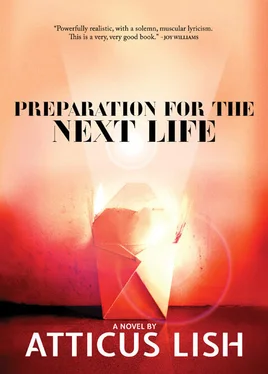She caught the train going the other way and took it all the way to Brooklyn, getting off downtown by the federal court buildings. There were cops in neoprene gloves and balaclavas and Arabs selling shishkawap, coal smoke blowing in the street, police barricades in front of the wide white buildings that looked like the White House.
For a time, she strolled casually, watching the cops to see if they were writing tickets to street vendors.
Then she went into a Wendy’s and went table to table flashing her movies. Big black couples told her no politely. A woman whose child was dressed the same as her boyfriend down to tiny sneakers and a denim hat told him: Jamal, stop playing.
A man asked if she had any kung fu.
They looked through what she had together. This one is kung fu, she told him. He said this is all right, but I want Jackie Chan.
Jet Li is good, she tried to tell him.
Jackie Chan is my man.
Howbout this one?
She held up a Hong Kong movie called Black Society in Chinese and Buttonman in English.
Gotta be Jackie Chan, he said. Let me tell you what’s wrong with this here. They doing side effects in this movie. Jackie Chan don’t have no side effects. He do all his own stunts. Look here — and he made a sudden flurry of blocks and strikes, smacking his own arms and shouting: Hut!
He wheeze-laughed. You see that, baby? Look here! He showed her his knuckles, which were calloused like the palms of his hands. All this here is from my Shaolin style. He took her hand and had her touch his hand. I never took no shit off these gunslingers out here.
Okay. I get for you. Next time.
I tell them, if you bad, bring it, thundercat!
She went back outside the restaurant. There was construction hammering in the street, a giant truck with cable on a reel. A man from Lahore, Pakistan, a city at the end of the Karakoram Highway which came out of Western China, was selling fruit on the corner of Fulton Street. His beard was red. He had a piece of cardboard that he prayed on. She watched an NYPD patrol car drive by him and the driver look at him, but they didn’t look at her. She felt throughout her body that she was protected.
The broad-shouldered American blacks rolling along Fulton Street looking in the windows of Jimmy Jazz wore big leather jackets with wings and eagles and griffins engraved across the shoulders in much the same pattern as Skinner’s tattoo.
He’s with you, she believed.
The NYPD would not stop her. If they scanned her, they would see an American flag on the scan. She beat her drum and his shadow flew before her. He raised her above the iron ground so her feet would not be torn. He kept her from being destroyed and defiled in a shitsmeared cell.
On Pennsylvania Avenue, there were low buildings, the huge space of the winter sky, a fence with a faded basketball behind it. She climbed through a hole in the mesh, stepping over empty twenties and forties, and cut downhill in the dead weeds, a figure in a hood and jeans, convinced she would not fall, and stood on the median beneath the interchange. When the cars stopped for the light, she went out to the driver’s side windows holding out her movies.
A woman bundled in a hat and hood and plaid jacket was selling roses. The light changed, and they went back to the median.
Con cuidado, the woman told her.
Yes. Sí.
And you watching la policía. Siempre.
The woman had a pretty face and conspicuous blackheads dotting her cheeks. She said she had a shopping cart that she could push away if the cops came, and she seemed to be saying that she had a van that she could put it in, but Zou Lei didn’t see one. The cops wrote her fines: one hundred, one-fifty, maybe two hundred.
Yes. Sí. But what about that?
The woman looked at herself where Zou Lei was pointing. She had a vendor’s license in a wallet strung around her neck. She held it in her mitten and said something about it. Then she tucked it in her plaid jacket pocket.
It cost money? Dinero is a lot?
The woman shook her head, talking Spanish. It was not a real license.
Zou Lei bounced on her toes, waiting for the cars to stop, rubbing her hands.
Mucho frío.
Zou Lei nodded, Yes, sí, she knew.
She was saying to herself: I will sell one more.
You could do anything — sell toys, oranges, ice in the summer, phone cards so that people could call home. Singapore. Philippines. Yemen. Iraq. Ivory Coast. Salvador. You could give out flyers for all-you-can-eat, compramos d’oro — get a cart and roll it over hill and dale now that he is with you.
She could take out a loan and buy a truck and then be truly free. And she fantasized that she and Skinner lived on the road together traveling from city to city, selling what they bought and traded. She saw them wearing sheath knives and cowboy hats and riding horses in a sun-filled land outside the reach of the authorities.
HE WANTED HER TO know that he was working too. I’m gonna follow the program that they got in here, start doin two-a-days. Doin my protein. All he had to do was find a gym without stupid rules and it was on.
He was from a place called Shayler, which he described as pretty basic. There were bars, Lutheran churches, and a 7-11. When he said home, he pronounced it hoeme. The houses went up a hill, like a mining hill, close to West Virginia. Under the highway going into town were mountains of gray gravel. A lot of bars, a lot of drinking. Steel Town football was big. People were pretty racist. But they were open about it. They could be friends with anyone. That’s just how they were. Real patriotic. His house had a raccoon under it. They were poor. It was a poor area, basically. His mother, a lean energetic woman with short blond hair, had sat in their trailer reading a Reader’s Digest and drinking vodka out of a blue plastic cup. She was really big on anything unusual. Nothing unusual ever happened for the most part — except drinking. When he was five, probably his first memory, his mother showed him a picture of a two hundred-pound dog in TV Guide and said, Look at that. You ever see anything like that before? He would have signed up even if the recruiters hadn’t come right to his high school. 9/11 was the big reason, but he would have gone anyway, just to do something.
As he talked, he had his tattoo-lettered arm around her and held his burning cigarette away from her while he smoked. He had played high school football, he said, and he remembered the stadium and the numbers on the score cards and the all-black team they played from the gangbanger area up the hill. A gas station outside the stadium was where they turned. All the white cars went down the hill to the white bars, and all the black cars went up the hill to the black bars on Lafayette Hill.
Did you have a lot of boyfriends?
No.
How do you say that?
Nanpengyou.
Nan-pong-yow. Did you?
No. I fight with boys. What about you father?
What about him?
You don’t tell me about him.
Skinner told her that once when he was seventeen, thereabouts, he was in a bar across the river and he realized the guy taking a leak at the urinal next to him was his father. He pictured him: Carhartt jacket and pants, incredibly hard hand when they shook hands, drinking with two women at the bar. That was his father. What about yours? Oh, yeah, I forgot. You told me all about him. The Chinese soldier. But girls? said Skinner. There’d been this one girl he’d liked, and the whole school had known he liked her. It had become a story that everyone talked about. It was the closest he ever came to being famous. When he would see her in front of school, they’d stare at each other with all this social pressure on them. She would just say hiiiiiiiiii, Brad. Nothing more than that ever happened. He never told her, I like you. There was no point in saying this since everyone else already knew it, including her. It was fifth grade and it was the beginning of the rumor mill.
Читать дальше












